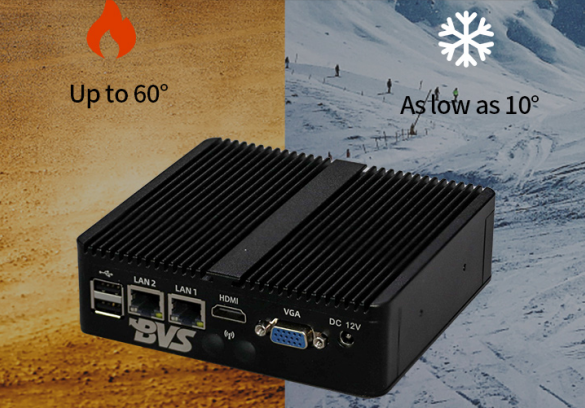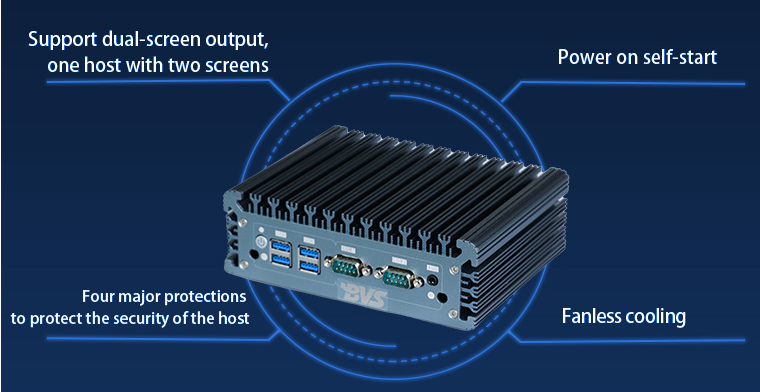When working in industrial or manufacturing settings, reliability and durability are essential. Industrial environments are often filled with dust, extreme temperatures, vibrations, and other harsh conditions that can damage or compromise standard computer systems. To address these challenges, industrial mini PCs are a great choice. These compact systems are designed specifically to withstand tough conditions while offering the power and functionality needed for various applications.
The most important feature to consider for an industrial mini PC in harsh environments is its build quality. Ruggedness ensures that the device can endure extreme conditions, including high levels of dust, moisture, and vibration. Look for mini PCs that are IP-rated (Ingress Protection) to safeguard against dust and water. An IP65 or higher rating is ideal for most industrial applications, as it guarantees the PC is fully dust-tight and protected from low-pressure water jets.
Additionally, a mini PC designed with military-grade components or a solid metal chassis (such as aluminum or steel) will offer extra protection against physical impacts or drops. This rugged construction ensures that your mini PC can continue to perform reliably, even in the most demanding environments.
Industrial environments often experience fluctuating temperatures. Whether it’s working in a cold storage warehouse or a high-temperature factory floor, your industrial mini PC needs to operate effectively in a wide range of temperatures. A system that can handle extreme temperatures—ranging from -10°C to +60°C (-4°F to 140°F)—is crucial to ensure that the device continues to run smoothly without failure.
Look for fanless industrial mini PCs with passive cooling systems that can function without overheating or excessive noise. These systems are not only energy-efficient but also better suited to handle temperature extremes, as they have fewer moving parts that could fail due to temperature fluctuations.
Industrial environments are often characterized by high levels of mechanical vibration and shock, especially in heavy machinery or vehicle applications. These physical factors can disrupt regular PCs, leading to crashes, data loss, or even permanent damage.
To ensure durability, an industrial mini PC should be able to resist vibrations and shocks that are common in factories or warehouses. Look for military-grade certifications like MIL-STD-810G, which guarantees the device can withstand vibration, shock, and other environmental stresses. These PCs are designed with solid-state components, like SSD storage, which is more resilient to vibrations compared to traditional hard drives.

While industrial mini PCs are compact in size, they should not compromise on performance. Ensure the mini PC you choose has sufficient processing power to handle the tasks it will be assigned, whether it's running complex applications or managing real-time data. A high-performance multi-core processor (like Intel Core i5 or i7, or AMD Ryzen) paired with sufficient RAM (8GB or more) will provide the processing power required for demanding industrial tasks.
That said, energy efficiency is also crucial. Many industrial mini PCs are designed with low-power consumption to minimize energy costs while ensuring continuous operation. Look for systems that offer efficient power usage, ideally with Energy Star or other energy-efficient certifications, without compromising on performance.
A key consideration when selecting an industrial mini PC is its connectivity options. In industrial settings, it's common to connect a range of devices, including sensors, cameras, displays, and other machinery. Your industrial mini PC should have a variety of I/O ports (USB, Ethernet, serial ports, etc.) and wireless communication options (Wi-Fi, Bluetooth, etc.) to ensure compatibility with other devices in your system.
For instance, industrial Ethernet ports are essential for reliable, fast, and secure data transmission over local networks. If your application requires real-time data monitoring or remote access, ensure the mini PC supports the necessary IoT protocols such as MQTT or Modbus. Additionally, the presence of expandable ports (like PCIe slots) can provide flexibility for future upgrades or additional hardware integrations.
Selecting the right industrial mini PC for harsh environments is crucial to ensure uninterrupted operations and reliability. By focusing on these 5 key features—rugged build quality, wide temperature range, vibration and shock resistance, powerful performance with low power consumption, and flexible I/O and connectivity—you’ll be able to make an informed decision that fits the specific needs of your industrial setting.
Investing in a high-quality industrial mini PC not only improves efficiency and performance but also helps to reduce downtime and maintenance costs. Be sure to consider your unique operational requirements before purchasing to ensure your chosen mini PC can withstand the challenges of your working environment.

Click to confirm
Cancel